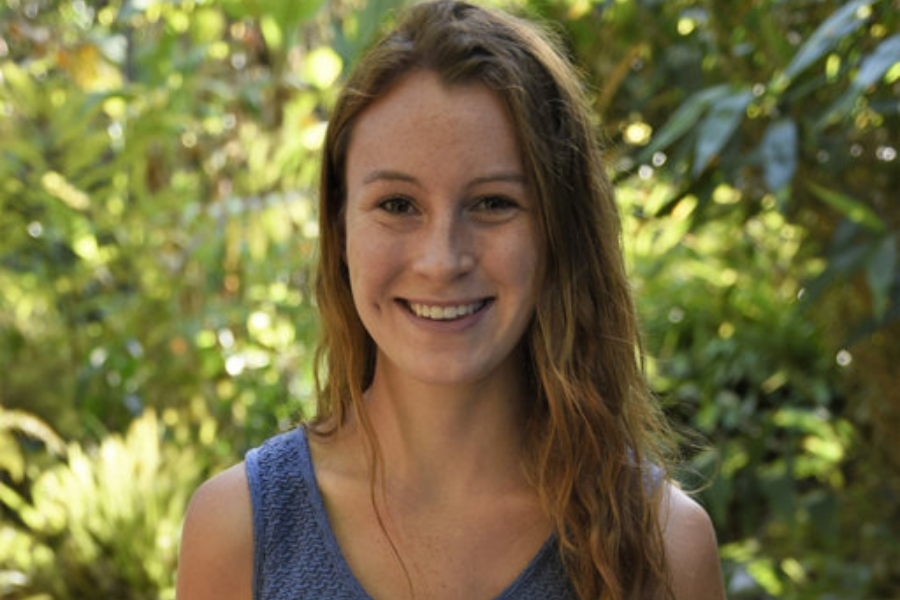Allie Blanchette

"I get to do what I love"
College: Arts and Sciences
Degree Program: Ecology and Evolution
Degree: Doctorate
Award: Women Divers Hall of Fame Marine Conservation Graduate Scholarship (2022)
Why FSU?
I chose FSU because I wanted to work specifically with my current advisor, Dr. Andrew Rassweiler, and I was really encouraged by the strong sense of community in the Ecology and Evolution group in the Department of Biological Science. I knew I wanted to pursue my graduate degree in Marine Ecology, but what I love about the research in our joint lab (with Dr. Sarah Lester) is that it always has valuable real-world applicability, relating to topics such as ecosystem restoration, fishing and aquaculture, and other societal benefits from the ocean. Additionally, I appreciate that we are not limited to just one system in our lab; rather, we have people exploring ecological questions all over the world in coral reefs, seagrass beds, oyster reefs, mangrove forests, and kelp forests. My visit to FSU sealed the deal though, when I was repeatedly told by faculty and students that one of their favorite parts of working here is the community in the E&E group. Pursuing a PhD can certainly be challenging, so I cannot emphasize enough the importance of a supportive community.
Motivation to pursue a graduate degree
I wanted to pursue a graduate degree because I have always wanted to know more about how ecosystems, especially marine ecosystems, work--why they are the way they are, and what the invisible rules are that dictate their composition. As an undergraduate, I worked in a research lab and loved the environment of collaborative teamwork in combination with the freedom to pursue the research questions that each person finds most interesting. I wanted to continue working in this environment. By pursuing a graduate degree and career in ecological research, I get to spend my time learning and thinking about ecosystem patterns and processes, to explore these ecosystems first-hand through fieldwork, and to investigate my specific interests within the broader context of a lab community.
Importance and/or impact of research and work
I study staghorn coral (Acropora cervicornis), which once formed expansive dense thickets across shallow coral reefs throughout the Caribbean. However, this species has declined up to 90 percent over the past several decades and is now critically endangered. There are many restoration programs throughout the Caribbean working to restore this species to its previous abundances, but it is still being threatened by large-scale stressors such as ocean warming and disease. I am collaborating with a coral restoration non-governmental organization in Bonaire (Caribbean Netherlands) to study if and how staghorn coral can adapt to common stressors, with the goal of making my research directly useful to restoration groups and natural resource managers to better restore and conserve coral reefs.
Career aspirations
My long-term career goal is to conduct marine research that informs fundamental ecology while also having valuable applications outside of academia, such as informing restoration and ecosystem-based management decisions. I see a variety of career paths in which I could do this, including as a professor at a research university, or as a scientist at a government agency such as NOAA or a non-governmental organization such as The Nature Conservancy.
Advice for anyone considering graduate school
Don't let fears of not being "smart enough" prevent you from pursuing graduate school. Things like a strong work ethic, passion for what you do, time management, and conscious work-life balance are what will help you in the most challenging parts of graduate school. On a similar note, I think graduate school is different from what a lot of people expect it to be, so I would really recommend getting involved with research as much as possible, especially in labs with graduate students, to see what it’s really like. Additionally, taking time off between undergrad and graduate school can be so valuable for figuring out what you want to do, figuring out what options are even out there, and taking time to decompress and recover from the stress of undergrad. I took three years between undergrad and graduate school to do a bunch of different ecology-related internships, and I truly believe I would have been doing myself a disservice if I didn’t take that time.
Accomplishments during graduate career
I am proud to have received the Women Divers Hall of Fame Marine Conservation Graduate Scholarship in 2022.
